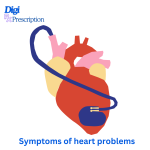
Symptoms of Heart Problems: Early Signs You Shouldn't Ignore
Heart disease is one of the leading causes of death worldwide, yet many people fail to recognize its early warning signs. Identifying symptoms early can help prevent severe complications, including heart attacks and heart failure. In this blog post, we’ll explore the common symptoms of heart problems and when to seek medical attention.
Common Symptoms of Heart Problems
1. Chest Pain or Discomfort
- A common symptom of heart disease is chest pain (angina), often described as pressure, tightness, or burning.
- It may occur during physical activity or stress and subside with rest.
- If chest pain is sudden, severe, or lasts longer than a few minutes, it could indicate a heart attack.
2. Shortness of Breath
- Feeling breathless after mild activity or even at rest can indicate heart problems.
- Heart failure and coronary artery disease can reduce the heart’s ability to pump blood, leading to difficulty breathing.
- Shortness of breath while lying down (orthopnea) is also a warning sign.
3. Fatigue and Weakness
- Unexplained fatigue, especially after routine tasks, may be an early sign of heart disease.
- If you feel constantly tired without a clear cause, it might indicate your heart is struggling to circulate blood efficiently.
4. Dizziness and Lightheadedness
- A sudden feeling of dizziness or fainting could result from reduced blood flow to the brain.
- This may be due to arrhythmias (irregular heartbeats) or low blood pressure caused by heart disease.
5. Irregular Heartbeat (Arrhythmia)
- If you frequently experience rapid, slow, or irregular heartbeats, you could have an arrhythmia.
- Skipped beats or fluttering sensations in the chest should not be ignored.
6. Swelling in Legs, Feet, or Ankles
- Fluid retention (edema) in the lower extremities can indicate heart failure.
- The heart’s inability to pump efficiently causes fluid buildup, leading to swelling.
7. Excessive Sweating
- Profuse sweating, especially cold sweats, can be a warning sign of a heart attack.
- If sweating occurs suddenly without exertion, it may be due to poor heart function.
8. Pain in the Neck, Jaw, or Arm
- Heart-related pain can sometimes be felt in areas beyond the chest, including the neck, jaw, shoulders, and arms.
- This symptom is common in women experiencing heart attacks.
9. Nausea, Indigestion, or Stomach Pain
- Some people, especially women, experience nausea, indigestion, or abdominal discomfort during a heart attack.
- If these symptoms appear suddenly with other heart-related signs, seek medical attention.
10. Persistent Cough
- A chronic cough, especially one that produces pink or white mucus, can indicate heart failure.
- Fluid buildup in the lungs due to heart dysfunction may trigger this symptom.
When to See a Doctor
If you experience any of these symptoms persistently or suddenly, consult a healthcare professional. Seek emergency help if you have:
✅ Chest pain lasting more than a few minutes
✅ Severe shortness of breath
✅ Fainting or loss of consciousness
✅ Unexplained excessive sweating
How to Protect Your Heart
- Adopt a Heart-Healthy Diet: Eat more fruits, vegetables, lean proteins, and whole grains.
- Manage Stress: Practice mindfulness, meditation, or yoga.
- Avoid Smoking and Excessive Alcohol: Both can damage your heart over time.
- Regular Health Checkups: Monitor blood pressure, cholesterol, and glucose levels.
Final Thoughts
Recognizing the symptoms of heart problems early can save lives. If you or someone you know experiences these warning signs, do not hesitate to seek medical advice. Prevention, lifestyle changes, and timely medical intervention can help keep your heart healthy.
References
-
American Heart Association (AHA) – www.heart.org
- Provides comprehensive information on heart disease symptoms, prevention, and treatment.
-
Mayo Clinic – Heart Disease Symptoms – www.mayoclinic.org
- Covers various heart conditions, symptoms, and when to seek medical attention.
-
Centers for Disease Control and Prevention (CDC) – Heart Disease Facts – www.cdc.gov
- Offers data and guidelines on heart disease risk factors and prevention.
- Discusses cardiovascular diseases, symptoms, and treatment options.
- Offers data and guidelines on heart disease risk factors and prevention.
-
Cleveland Clinic – Heart Disease Warning Signs – www.clevelandclinic.org
- Provides expert insights into heart disease symptoms and early detection.
